- Home
- Edward Rutherfurd
New York Page 2
New York Read online
Page 2
Yet were the people grateful? Of course not. They resented his rule. They even thought they could govern themselves, the fools. Were these men capable of governing? She doubted it.
The worst of them had been a two-faced lawyer, van der Donck. The Jonker, they’d called him: the squire. He was the one who went behind the governor’s back, who composed letters to the West India Company and published complaints—all to bring down Stuyvesant. And for what? “The Jonker is a lover of liberty,” her husband used to tell her. “You’re all fools,” she would cry. “He loves only himself. He’ll rule you in Stuyvesant’s place if you give him half the chance.”
Fortunately the Jonker had failed to destroy Stuyvesant, but he’d managed to get his hands on a big estate north of the city. He’d even written a book on New Netherland which her husband assured her was fine. The wretch was dead and gone now—thank God! But the people of New Amsterdam still called his big estate “The Jonker’s Land,” as if the fellow were still there. And his example had so infected the merchants that, in her opinion, Stuyvesant shouldn’t trust any of them.
The governor’s hard eyes were fixed on her.
“Can I count upon you, Greet?”
Her heart missed a beat. She couldn’t help it.
“Oh yes.”
He was happily married, of course. At least, she supposed he was. He and Judith Bayard lived up at their bouwerie, as the Dutch called their farms, with every appearance of contentment. Judith was older than Peter. It was she who’d nursed him back to health after he lost his leg, and married him afterward. So far as Margaretha knew, he’d only once had an affair, and that had been when he was a young man, long before he met Judith. A small scandal. She thought the better of him for it. If it hadn’t been for that little scandal, he might have become a Calvinist minister like his father, instead of joining the West India Company and going to seek his fortune on the high seas.
“And your husband? Can I count on him?”
“My husband?” Wherever he might be. Avoiding her.
Well, that was about to change. While he’d been away, she had given the matter some thought and formulated a plan for his future that would be more satisfactory. It was lucky that Dutch custom gave women far more freedom—and power—than the women of most other nations. And thank God for Dutch prenuptial agreements. She had some very definite plans for Dirk van Dyck, when he came home.
“Oh yes,” she said. “He’ll do as I say.”
“I am going down to the fort,” Stuyvesant said. “Will you walk with me?”
London. A cheerful spring day. The River Thames was crowded with ships. Thomas Master gazed at the vessel before him and tried to decide.
In his hand was the letter from his brother Eliot, telling him that their father was dead. Tom was too honest to pretend he was sorry. He was twenty-two, and now he was free.
So which should it be? England or America?
On his left lay the great, gray mass of the Tower of London, silent, giving nothing away. Behind him, as he glanced back, the long, high roof of Old St. Paul’s suggested disapproval. But of what? Of himself, no doubt. After all, he’d been sent to London in disgrace.
Thirty years ago, when Adam Master from England’s East Coast and Abigail Eliot from the West Country had first met in London, these two earnest young Puritans had agreed that England’s capital was a shocking place. King Charles I was on the throne; he had a French Catholic wife; he was trying to rule England like a despot, and his new henchman, Archbishop Laud, was determined to make all Englishmen conform to the high ceremonies and haughty authority of an Anglican Church that was papist in all but name. After they married, Adam and Abigail had stuck it out in London for a few years, in the hope that things might get better. But for Puritans the times had only got worse. So Adam and Abigail Master had joined the great migration to America.
Englishmen had been going to Virginia for two generations. By the time Shakespeare’s Globe Theater was performing his plays on the Thames’s south bank, half the population of London were smoking clay pipes of Virginia tobacco. But the number who’d actually left for Virginia was still modest. A few hardy souls had ventured to Massachusetts; other settlements had also started. But it was hardly a migration.
In the second half of King Charles’s reign, however, something completely different occurred. The Puritans of England started leaving. From the south, the east, the west, they gathered in groups, sometimes families, sometimes whole communities, and took ship across the Atlantic. There was hardly a week when a vessel wasn’t sailing from somewhere. From the mid-1630s, King Charles of England lost about a fiftieth of all his subjects in this manner. Gentlemen like Winthrop, young men of means like Harvard, merchants and craftsmen, laborers and preachers, with their wives and children and servants—they all took ship for America, to avoid King Charles and his Archbishop. This was the first real peopling of the American colonies, and it took place in little more than a decade.
King Charles never seemed to have felt any embarrassment at this loss. Indeed, it wasn’t a loss; more of a gain. Rather than give him trouble at home, where he was trying to establish his authoritarian rule, they had obligingly gone to settle a huge new extension to his kingdom. Wherever they went on this huge, uncharted American continent, the land was England’s; for they were still all his subjects, every one. As for the freedom of worship they enjoyed, it was out of sight, and could probably be corrected, later on.
Adam and Abigail Master had gone to Boston. There they had found the harsh, sometimes cruel godliness of the congregation to their liking. They were not, after all, seeking tolerance; they were setting up God’s kingdom. And their elder son Eliot had followed them closely in this regard. Studious, cautious, determined, Eliot was everything a Boston father could wish for. But Tom had been another matter.
Tom Master was a fair-haired, blue-eyed fellow. Though he had slightly protruding teeth, women found him attractive. As a little boy, he was slim, always on the move, inventive. By the time he approached manhood, his whole demeanor suggested a quick, good-humored sharpness. He was full of vigor. But his behavior and his choice of friends left much to be desired.
For even in those early days, it had to be confessed, there were those—seafarers and fishermen, merchants and farmers, to speak nothing of the meaner sort—who were more concerned with the money to be made in Massachusetts than the saving of their souls. The congregation imposed its will as much as possible, but there were many backsliders.
And young Tom, to the great regret of his parents and of his brother Eliot, seemed destined to be heading straight for hell. He did not work at his lessons. He had the ability, but he would not apply himself. He got drunk. He kept bad company. Once, he even missed Sunday worship. And though his father had not spared the rod, he could see after a while that it was not a question of discipline, or precept. There was something deep in Tom that his father did not know how to change.
Adam Master had built up a good, sound practice as a lawyer. He’d bought a farm. He owned a ship. Eliot had studied law, but wanted to preach. Tom had been apprenticed to a merchant, and shown an aptitude for business. That was something, at least.
But two events had broken his father’s heart. The first had been when Abigail lay dying. She had sent for her second son and, in the presence of his father, begged him to reform his life. For his own sake, and to help her depart in peace, she begged him to promise her that he would never drink another drop of liquor in his life. By that first step, she hoped, he might yet turn to better ways. And what had he said?
“Aw, hell, Ma. You know I can’t promise that.” To his mother on her deathbed. Adam could never forgive his son for this incident. He did not quarrel with Tom. He knew it was not what Abigail would have wished. He was polite. He did all that a father should. But he knew that Tom was no good.
So when Tom, at the age of nineteen, had enjoyed his first affair with the wife of a sea captain while that worthy man was away on a voyage—th
e captain of the very ship that Adam owned—his father managed to keep it quiet, for Eliot’s sake. But he told young Tom that he was to leave Massachusetts at once. He had sent him, with a somewhat bleak letter of introduction, to a merchant he knew in London. And with instructions not to return.
Tom had been exiled back to the Old World. He was not good enough for the New.
Tom had liked London. It suited him. Though Cromwell and the Puritans had ruled England for a decade, the great experiment in ruling without a king had finally descended into confusion and martial law. By the time Tom arrived, the English had restored the dead king’s son, a second King Charles, to the throne. And King Charles II was a merry fellow. His younger brother James, the Duke of York, might be proud and stiff, but the King himself was flexible and cautious. He had no wish to be turfed out like his father. After years of exile, he wanted to have fun, and was glad if his subjects did too. He loved chasing women, racing horses and visiting the theater. He also took a genuine interest in science.
The London Tom encountered was on the cusp between two worlds: the medieval and the modern. With Britain’s overseas domains expanding, London’s busy merchants had many opportunities to make their fortunes. Rich aristocrats and gentlemen set the tone of fashion. There were all kinds of entertainment. For a year Tom had been very happy.
And yet, after a while, he’d begun to yearn for America. Not for Boston or his Puritan family, but for other things that were harder to define. A sense of space, of new frontiers, of making the world anew. A longing for freedom. The freedom of the wilderness, perhaps. He couldn’t have put it into words.
And now, with his father dead, he supposed there was nothing to stop him returning.
There was another development, also, to be considered. Here in London, there were rumors that King Charles II and his brother James were taking a new interest in the American colonies. If so, that would be all the more reason for an ambitious young fellow like himself to look toward America again.
So what should he do? Should he stay and enjoy the amusements of London, or venture across the ocean? It would be easy enough to tell the merchant he worked for that with his father dead, Eliot had summoned him home. It certainly wouldn’t take him long to pack his few possessions. The ship in front of him was leaving tomorrow for Boston. The captain had a berth for him. Should he take it?
He paused, laughed to himself, took out a coin and tossed it. Heads: Boston. Tails: London.
Up in the north, the thunder spoke. But ahead, as the big river reached the open waters of the harbor, was a lake of liquid gold.
Van Dyck had tried to show Pale Feather the significance of the place the night before, using a map he had made himself. Pointing with the stem of his pipe he had explained.
“This line, which runs straight from top to bottom, is the North River. Many days upriver there are big lakes and waterways that extend all the way up to the regions of ice. To the left of the river”—he swept his pipe across the paper—“lies the whole continent of America. To the right,” and here he indicated a huge, triangular wedge of land, with its point down and its wide base sweeping out into the Atlantic, “are the territories of Connecticut, Massachusetts and many other places. And here beside them is the great ocean that my people crossed.” Tracing his pipe down to the southern tip of the wedge, he indicated another striking feature. For here a long island, about twenty miles across and a hundred miles from end to end, lay moored as it were, alongside the wedge in the Atlantic. Between this island and the mainland coast there was a long, sheltered sound. “All round this area”—he indicated the bottom of the wedge and the neighboring end of the island—“your people dwelt for many generations. And this”—he tapped the southernmost point of the wedge—“is Manhattan.”
Manna hata: it was an Indian name. So far as he knew, it just meant “the Island.” The place was a narrow peninsula, really; except that at its northern tip, a small, steep gorge allowed a channel of water from the North River to snake round into the long island’s sound, converting the peninsula of Manhattan, technically, into an island.
Had it not been for the great breakwater of the long island protecting its ocean side, Manhattan would have been exposed to the full force of the Atlantic. But thanks to this happy circumstance, as the North River came down to the tip of Manhattan, it entered a splendid, sheltered harbor about four miles wide and seven long—a spacious anchorage known to mariners as the Upper Bay. Better yet, as one passed through the narrows at the harbor’s southern end to encounter the Atlantic, two huge sandbars, one on each side, served as outer breakwaters against the ocean swell, creating the calm waters of the Lower Bay, so vast that all the ships in the world could well have lain at anchor there.
“It’s the gateway to the north,” he had explained. But Pale Feather had not understood. And though he had spoken to her further of trade and transport, he could see that she did not grasp the significance of the white man’s map.
White men had been coming there since the days of Christopher Columbus. At first they had been seeking gold, or trying to find a route to the Orient. One, Verrazano, who arrived in 1524, was known by name; others had been forgotten. And not always white men either: the Portuguese sea captain Gomez had been black. He’d come, grabbed nearly sixty of the local Indians to sell as slaves, then disappeared over the horizon. But it was the arrival of another man which had changed everything for the people of the great North River and its harbor.
Henry Hudson had been an Englishman, employed by the rival Dutch, to find a shorter route to China by sailing east. Having had a look for this fabled North-East passage above Russia and decided it was useless, he’d ignored all his orders, doubled back across the Atlantic, and looked for a passage round the North-West instead. It was Hudson who had ventured into the bay below Manhattan, and gone up the big river for several days before concluding: “It isn’t the way to China.”
“It may not lead to China,” he’d told his Dutch employers upon his return, “but the land is magnificent. And full of beavers.”
And the people of northern Europe had an insatiable greed for beavers.
“The beaver,” van Dyck would tell his children, “is a most useful creature. Beaver oil cures rheumatism, toothache and stomach pains. A beaver’s testicles, powdered and dissolved in water, can restore an idiot to sanity. Its fur is thick and warm.” But it was the soft pelt under the outer fur that men really desired. And why? Because it could be made into felt.
Hats. Everyone wanted a felt hat, though only the richer souls could afford one. It was the height of fashion. The hatters who made them sometimes went mad, poisoned by the mercury that used to separate the felt from the fur. And perhaps, van Dyck admitted to himself, there was a certain madness in this—that a whole colony, an empire perhaps, could be founded, men risk their lives and kill in turn—all on account of a fashionable hat. But such was the way of the world. The coast of north-eastern America might have been colonized for the Atlantic fishing trade, but the great harbor of New Amsterdam and its big North River were settled because of the felt hat.
And it was in gratitude to the intrepid explorer that van Dyck and fur traders like him would often refer to the big river not as the North, but as Hudson’s River.
“There it is. New Amsterdam.” The Dutchman smiled to see his daughter’s shiver of excitement. Ahead, the southern tip of Manhattan jutted out into the harbor’s watery immensity. Seabirds wheeled over the small waves. There was a bracing saltiness in the air.
Pale Feather gazed at the big sails of the windmill and the squat mass of the fort which presided over the open waterfront. As they rounded the tip of Manhattan, where the merchants’ gabled houses had gathered themselves, more or less, into rows, van Dyck pointed out some sights to her.
“You see those houses near the fort? Your people had a camp there before the White Men came. They left such piles of oyster shells behind that we called it De Peral Straet—the street of pearls. That pale house belo
ngs to Stuyvesant. It’s called the White Hall.”
Passing the southern point, they turned into the long, broad channel that ran up the eastern side of Manhattan. Though not really a river, this waterway was known as the East River. Van Dyck indicated the land on the opposite bank.
“Brooklyn.” The Dutch had named it after a place near Amsterdam.
“My people’s land,” the girl said.
“It was.”
The wharf had been built on the east side of the point. The canoe made toward it. Several ships lay at anchor in the East River nearby. As they reached the landing, curious eyes were turned upon them.
It did not take long to arrange for the pelts to be carried in a pair of large handcarts to the West India Company’s big storehouse. Van Dyck walked beside the carts, with Pale Feather moving lightly beside him. He nodded briefly to men he knew. There were all kinds of folk by the waterfront: sailors in open shirts, merchants in broad pantaloons, even a dominie, dressed in black and wearing a tall, conical, wide-brimmed hat. As they left the shore, he met a pair of Dutch merchants, Springsteen and Steenburgen, men of some substance, with whom it was necessary to pause for a moment to exchange greetings.
“Your wife was talking to Stuyvesant by the fort, Meinheer van Dyck,” remarked Springsteen.
“You may meet her any minute,” said Steenburgen.
Van Dyck cursed inwardly. Yesterday the plan had seemed easy enough. His men would unload his boat and the Indian canoe. The Indians would wait to return with the tide. That would give him time to show Pale Feather around the little town and give her some Dutch cookies—the happy culmination of the brief time they’d spent together. Then the Indians would take her safely back upstream, and he’d go home to his wife and children.

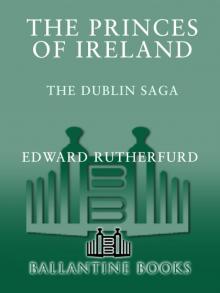 Princes of Ireland
Princes of Ireland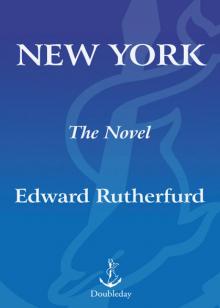 New York
New York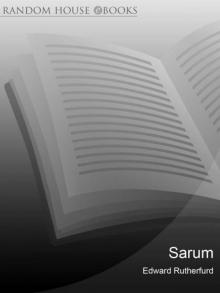 Sarum
Sarum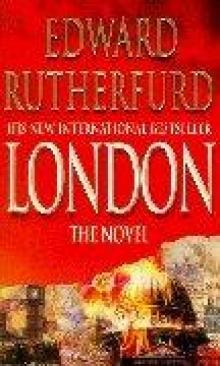 London
London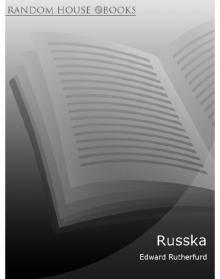 Russka: The Novel of Russia
Russka: The Novel of Russia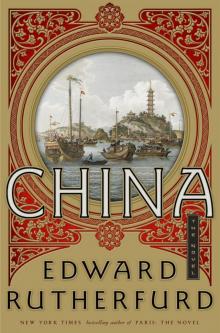 China
China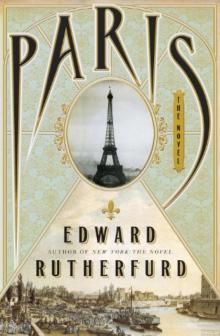 Paris
Paris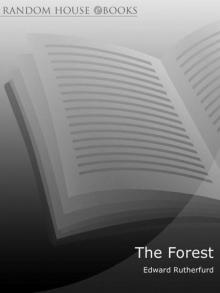 The Forest
The Forest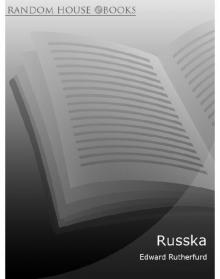 Russka
Russka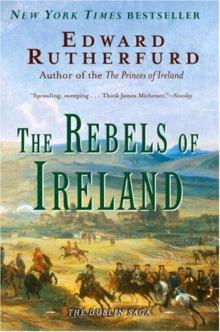 The Rebels of Ireland: The Dublin Saga
The Rebels of Ireland: The Dublin Saga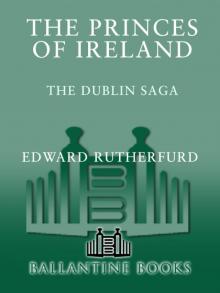 The Princes of Ireland
The Princes of Ireland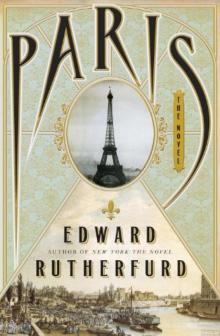 Paris: The Novel
Paris: The Novel